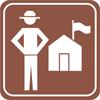FRS Radios

Smaller Wattage Output, Family Radio Service (FRS) is one of the Citizens Band Radio Services. It is used by family, friends and associates to communicate within a neighborhood and while on group outings and has a communications range of less than one mile. You can not make a telephone call with an FRS unit. You may use your FRS unit for business-related communications. FCC Information
What to look for
Icom FRS Radios
Reviews
Popular Wireless Forums
Cobra Radios
Information and Links from the Personal Radio Steering Group
Midland's Commonly Asked Questions
Getting Started
Comparisons
Information from the Communications Technology Review
Links

GMRS Radios
Higher Wattage Output. Must apply for a licence from the FCC. These radios may not be used for commercial purposes. The General Mobile Radio Service (GMRS) is a land-mobile radio service available for short-distance two-way communications to facilitate the activities of an adult individual and his or her immediate family members, including a spouse, children, parents, grandparents, aunts, uncles, nephews, nieces, and in-laws (47 CFR 95.179). Normally, as a GMRS system licensee, you and your family members would communicate among yourselves over the general area of your residence or during recreational group outings, such as camping or hiking.
The FCC grants five-year renewable licenses for GMRS Systems. The individual licensee is responsible for the proper operations of the licensed GMRS system at all times.
Midland Radio
FCC Information
Cobra Radios
Popular Wireless Forums
Piracy Forums
Reviews
Information and Links from the Personal Radio Steering Group
Multi Use Radio Service Information
Commonly asked questions
Marine Radios
Another must have on your vessel. With the introduction of DSC (Digital Selective Calling), VHF radios are beginning to enter the realm of multi-function marine electronics, working in tandem with GPS units to provide higher levels of safety and convenience. There are even VHF models now available with display mapping capabilities.
While all new fixed-mount VHF radios are required by law to have DSC, there are still models currently on the market (based on older product platforms) that do not include this powerful safety feature. In time, however, these radios will eventually be phased out and replaced with units that incorporate DSC.
Although reliability, range and audio clarity are still the main factors you should consider when selecting a VHF radio, DSC functionality is also important - especially in a boat's primary fixed-mount unit. First and foremost, a DSC-enabled VHF allows the user to send out a digital distress call with the touch of a button. If the radio is connected to a GPS or loran, it can also instantly transmit the exact coordinates of your boat. The DSC unit will continue to send this information until it is received by another station. This type of automated "Mayday" message, complete with vital position data, should help save lives in emergency situations.
Along with the significant safety advantages, the latest DSC-equipped VHF radios offer boaters additional benefits. By using a radio's unique MMSI (Maritime Mobile Service Identity) number, you can establish a direct, private calling line with another selected user, similar to a cell phone connection. While this is a feature that any boater can appreciate, it seems tailor-made for anglers. Using the privacy afforded by DSC, an angler can let a DSC-equipped buddy know about a "hot bite" and supply the coordinates, without alerting the entire fleet.
Selections from Boaters World
Article on VHF Radios
Icom Radios
Marine Radio Information
Marine VHF Radio Channels
Coast Guard Navigation Center

Personal Locator Beacons
On July 1, 2003, the FCC authorized the use of Personal Locator Beacons (PLBs). PLBs will provide a distress and alerting capacity for use by the general public in life-threatening situations in remote environments after all other means of notifying search and rescue (SAR) responders (e.g., telephone, radio) have been exhausted. For example, if you are a hiker, camper, backpacker, kayaker, etc. and are out of cell phone range, a PLB, which is a small transmitter that sends out a personalized emergency distress signal, is a highly effective and internationally recognized way to summons help.
FCC Information
ACR Electronics
Frequently Asked Questions

Sattelite Phones
This will get a signal if you can see the sky. Rental programs are available for that backcountry adventure.

Weather Radios/Emergency Alert Radios
Handy tool to have in your pack if you are within distance of the signal. All Hazards/Weather Emergency Alert Radios are special receivers that tune to the 24/7 broadcasts issued by the National Weather Service.

These broadcasts can be received up to 50 miles from any NOAA transmitter, and the radios can be easily tuned to find the clearest signal nearest to the user’s location.
NOAA Weather Radio (NWR) is a nationwide network of radio stations broadcasting continuous weather information direct from a nearby National Weather Service office. NWR broadcasts National Weather Service warnings, watches, forecasts and other hazard information 24 hours a day. Working with the Federal Communication Commission's (FCC) Emergency Alert System, NWR is an "all hazards" radio network, making it your single source for comprehensive weather and emergency information. NWR also broadcasts warning and post-event information for all types of hazards--both natural (such as earthquakes and volcano activity) and environmental (such as chemical releases or oil spills).
Known as the "Voice of NOAA's National Weather Service," NWR is provided as a public service by the National Oceanic & Atmospheric Administration (NOAA), part of the Department of Commerce. NWR includes more than 850 transmitters, covering all 50 states, adjacent coastal waters, Puerto Rico, the U.S. Virgin Islands, and the U.S. Pacific Territories. NWR requires a special radio receiver or scanner capable of picking up the signal. Broadcasts are found in the public service band at these seven frequencies (MHz):
162.400
162.425
162.450
162.475
162.500
162.525
162.550

Weather Radios from Midland
NOAA Weather Radio
Commonly Asked Questions
|







